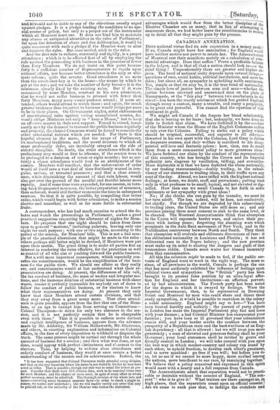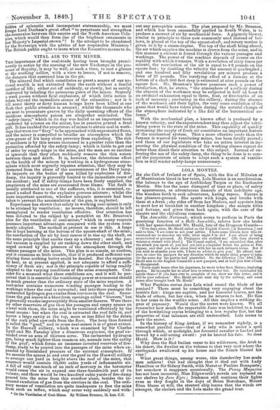CANADIAN ANNEXATION.
DOES national virtue find its sole expression in a money profit' If so, Canada might have her annexation ; for England would have neither motive nor power to retain her, The Annexationists of Montreal rest their manifesto mainly on a calculation of cons. mercial advantage. Does that suffice ? Prove a profitable balance in the ledger, and is that all that a nation should look to—or the chief thing Unquestionably there are greater and higher ob. jects. The bond of national unity depends upon several things,— questions of race, social habits, political institutions, and more be. sides ; but above all, on sympathy in upholding noble sentiments. Yes, simple as that tie may be, it is the true bond of nationality, The simple love of justice between man and man—whether the justice between crowned and uncrowned man on the plain of Runnymede, or the "fair play " between two combatants in the street—has been the sturdy sentiment which has guided England through many a contest, many a trouble, and many a perplexity, to be great and powerful. You cannot find the equation of that sentiment in gold.
We might ask Canada if she forgets her blood relationship, that she is leaving us for lucre ; but, unhappily, we have done no little to forfeit that claim. We have forfeited it by the conduct
of the Minister whom the House of the English Commons suffers to rule over the Colonies. Failing to strike out a policy which should be original, successful, and superior to all others,—
thwarted in his own sport with the Colonies, Lord Grey is driven to desperate courses, and their welfare is sacrificed to his disap-
pointed self-love and fantastic spleen : how, then, can he recall
them from a mere commercial policy to more generous ideas? We have forfeited our claim by the conduct of the representative of this country, who has brought the Crown and its Imperial authority into disgrace by vacillation trifling, and cowardice. More deplorable is it that we have forfeited the claim nationally, by our trading statesmanship—doubly trading, in the subser- viency of our statesmen to trading ideas, in their traffic upon any cant of the day. Abroad, we have trifled with the highest national
feelings ; at home, we doubt, scoff, and prevaricate; putting trust only in what professes to be small, topical, and not elevated or dig- nified. How then can we recall Canada to her faith in noble sentiments or her sympathy with great ideas I
No; if she thinks she can gain by the transfer, we must let her turn adrift. The loss, indeed, will be hers, not exclusively, but chiefly. For though we are degraded by this subserviency to trading ideas, the United States are still more so ; and any province joining them must consent to sink to the same level, or be cheated. The Montreal Annexationists think that absorption in the Union will supersede border wars, and endow their pro- vince with lasting peace; forgetting the alarming wars which germinate in the Anti-Rent movement of New York, and in the Nullification controversy between North and South. They think that absorption will overrule and obliterate dissensions of race : it has obliterated nationality in Louisiana and Florida ; it has not obliterated race in the Negro helotry; and the new province must make up its mind to sharing the dangers and guilt of that tremendous riddle. Canada must waive her blessed immunity from that contamination.
All this the colonists might be made to feel, if the public ser- vants of England went to work in the right way. The more so since, of all provinces in the world, Canada is perhaps the one that has most uniformly exhibited the influence of feelings upon political views and sympathies. The "British" party has been brought to its present false position by an ultra-loyal affec- tion for England and her institutions—an affection pervert- ed by bad administration. The French party has been noted
for the degree in which it is swayed by feelings. Were the
Imperial Government, then, to be represented in Downing Street and Montreal by men who could share and direct these ready sympathies, it would be possible to reawaken in the colony a noble nationality. England might say to her—" You have been treated harshly and unfairly : the pursuit of party objects in London has made the Imperial Parliament play fast and loose with your finance ; a bad Colonial Minister has exasperated your factions ; you have been so ill governed that your colonization stands still, and your border marks the confines between the prosperity of a Republican state and the backwardness of an Eng- lish dependency : all that is allowed : but we will treat you more generously ; a man of elevated and generous feeling shall be your
Governor ; your local statesmen shall be invited, to grave and friendly council in London ; we will take counsel with you upon
the best way in which mother-country and colony can stand by
each other, to uphold freedom, to develop each other's greatness, and to serve mankind : go free if you will; but before you do
so, let us see if we cannot be more happy, more exalted among the nations, more beneficent to our race, by remaining together!' We believe that a policy conceived and expressed in this spirit would meet with a hearty and a full response from Canada. The Annexationists admit that separation would not be practi- cable or desirable without the consent of England. " The con-
sent" ! who is to give it? What traitors are there amongst Sat in high places, that the separatists count upon an official consent ? Are we come to such pass that, to' indulge the crotchets and
foibles of splenetic and incompetent statesmanship, we must forego Lord Durham's great effort " to perpetuate and strengthen the connexion between this empire and the North American Colo- nies, which would then form one of the brightest ornaments in her Majesty's Imperial crown "? Is the attempt to be abandoned by the Sovereign with the advice of her responsible Ministers ? The British public ought to learn what the Executive means to do.



























 Previous page
Previous page